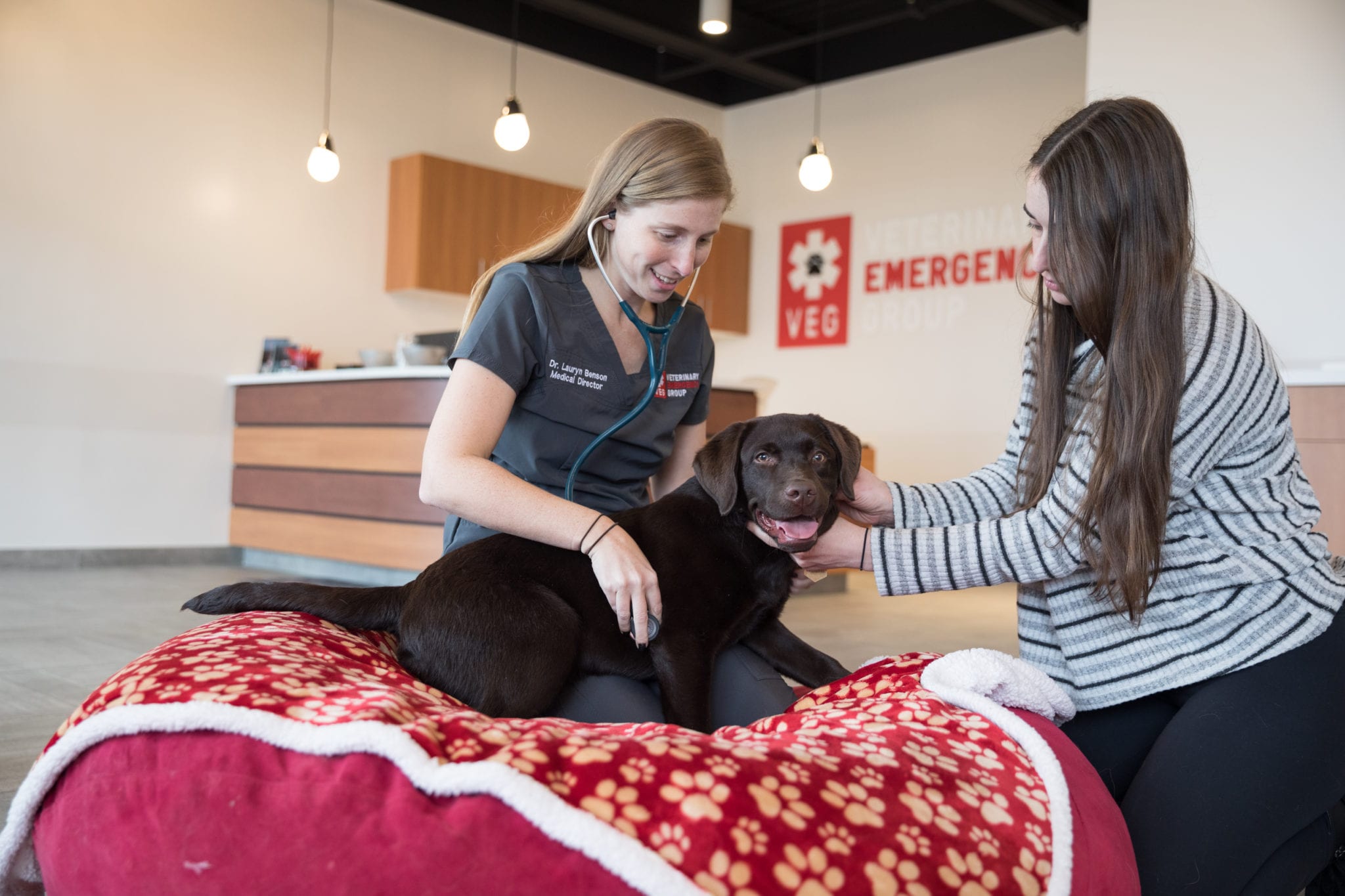
7 Signs of an Allergic Reaction in Dogs
Dr. Casey Smallwood
Call & Speak with a doctor Open 24/7, Even Holidays!
Walk in today for:
Emergencies
Point-of-Care Ultrasound
Urgent Care
X-Rays
Diagnostics + Testing
End-of-Life Care
Surgery
Treatment + Hospitalization
Runny snout, itchy eyes…what’s going on with your poor pooch? Well, just like us humans, allergies can plague dogs with uncomfortable symptoms. If you see your pet suffering from what looks like severe allergic reactions or long-term seasonal allergies, there’s a strong chance you’re right.
It’s important to speak to your primary care vet if you think your dog is dealing with allergies. In serious cases, that we’ll discuss in this blog, VEG is here with emergency treatment for your dog.
Below, you can read up on the different types of canine allergies and what to do in case you notice symptoms. Addressing this problem sooner rather than later will ease your buddy’s allergy blues.
TYPES OF DOG ALLERGIES
Woe is your doggo. Something’s got your furry friend feeling down and you suspect allergies. But you’re not sure if it’s the weather, something in the home, or another reason altogether. VEG is here to help! Check out this list of the four most common types of allergies in dogs. Each has its own causes and treatments, but understanding the categories can make a big difference in how well you recognize your dog’s allergic reaction.
1. Food allergies
Your dog is usually quite the foodie! But now your pal has a sick stomach after eating certain types of food. This could be a food allergy, and the most common symptoms you’ll see is vomiting or diarrhea. However, food allergies may also present as skin conditions or fur loss, so be on the lookout for skin and hair problems.
2. Skin allergies
Yeesh, your pup usually does well in the great outdoors, but something is wrong. Skin allergies! Make sure your pet is on regular flea/tick preventative, which you can get through your primary veterinarian. We mention this because skin allergies in dogs can often be caused by exposure to fleas or ticks. It’s also possible that plants or yard treatment chemicals are irritating your dog’s skin. A skin allergy will present as:
- Hives (small, raised red bumps all over the skin)
- Itchiness
- Redness
A skin allergy for your dog can be caused by other things too. Have you tried a new detergent recently? New rug cleaner? Any of these could be the culprit, but you can likely rule them out quickly if you remove the suspected irritant from any contact with your dog.
3. Seasonal allergies
It’s breezy and your dog is sneezy. If you notice your dog getting sick (ear infections, licking or chewing at their feet, sneezing, etc.) around the same time every year or notice him sneezing more often when he’s been outside all day, there’s a chance it’s seasonal allergies. Check out all of the allergy types in this blog, because it’s important to rule out other factors to make sure this is the case.
4. Acute allergies
Dogs who have sudden allergic reactions to irritants have acute allergies. Most commonly caused by pesky insect bites or stings, acute allergies may have other causes as well. An acute allergy will show as:
- Facial swelling
- Vomiting
- Trouble breathing and collapse – in severe cases, this is an anaphylaxis reaction
Acute allergies may need immediate emergency vet treatment. Call or come in to your nearest VEG if you notice any of these signs. Our ERs are open 24/7, so call anytime and speak with a doctor who will answer your questions.
SYMPTOMS OF ALLERGIC REACTIONS IN DOGS
Now, we’re sure you’re itchin’ to know about the seven allergy symptoms in dogs! Here are the most common reactions and what to do about them:
1. Itchiness and hives
Is your dog scratching a lot or have red areas of skin? These reactions are common in all types of allergies. If scratching and hives are the only symptoms you notice, you can wait a day or two before scheduling a GP vet visit. But if they’re coupled with any other symptoms, get to VEG soon. You may be tempted to give your dog allergy medication because they’re having a rough go of it, but call VEG for advice before doing so.
2. Diarrhea, vomiting, and upset stomach
If your dog has diarrhea or is vomiting, visit Veterinary Emergency Group as soon as possible so your dog can get the care he needs right away. Caution: this may be a sign of an early anaphylactic reaction.
3. Itchy ears
Though totally annoying for your dog, itchy ears usually aren’t a sign of anything life-threatening, and can wait for a primary care veterinary visit. However, if your pet is increasingly uncomfortable and/or starts to have any trouble walking, or your dog’s head is tilted to one side, get to VEG asap for treatment.
4. Sneezing and runny nose
Your pup’s achoos are totes adorbs, but beware, when sneezing and/or runny nose is accompanied by fever or by any other symptoms on this list, your dog requires immediate veterinary intervention. They may be signs of seasonal allergies and could be very benign, but it’s important for your vet to check for the cause of your dog’s allergic reaction.
5. Runny eyes
Watery, runny eyes need to be checked out by your primary care vet, even if you think they’re just due to an allergic reaction. This can also be a symptom of upper respiratory infection. Another reason for runny eyes is if there is damage to the eye itself (scratch or ulceration of the cornea). Rule out these potential issues by taking your dog to your vet to find out the real cause.
6. Frequent licking or chewing on skin
This symptom of a dog allergy kind of hides in plain sight! If your dog chews or licks his skin—especially his feet—frequently or seemingly nonstop, this is a sign he’s dealing with some form of allergies. Who knew?
The problem could come from exposure to irritants in the backyard or on walks, but it may also be a symptom of food allergies in your dog. Although not an emergency, you’ll need to go to your primary care vet to determine how to treat it and what the underlying cause might be.
7. Swollen face
Take heed, a swollen face or snout is a sign that your dog may be headed into anaphylactic shock. Although dogs with a swollen face don’t always suffer anaphylaxis, it is common. We recommend bringing your dog in to be seen by an emergency vet at VEG if there is any facial swelling. We’ll triage your dog immediately, and provide treatment to prevent it from getting worse. If there’s enough swelling going on, it could lead to other signs such as trouble breathing, so don’t wait it out.
SEE A VET FOR ALLERGIC REACTIONS IN DOGS
Now that you know a little bit more about what to expect from your dog’s allergic reactions, you can determine whether or not it’s an emergency or if you can wait to schedule a regular vet appointment.
The veterinarians at VEG are here and ready to help with your dog’s allergic reactions or any emergency your pet may be experiencing. We’re open 24/7 and you’ll see a doctor right away. Best of all, you never have to leave your dog’s side. Have questions about VEG? We have answers!

